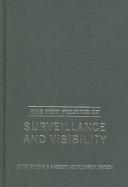| Listing 1 - 10 of 14 | << page >> |
Sort by
|
Book
ISBN: 0409829250 9780409829259 Year: 1981 Publisher: Toronto: Butterworths,
Abstract | Keywords | Export | Availability | Bookmark
 Loading...
Loading...Choose an application
- Reference Manager
- EndNote
- RefWorks (Direct export to RefWorks)
343.9 --- Criminologie --(algemeen) --- 343.9 Criminologie --(algemeen)

ISBN: 9780745638294 0745638295 Year: 2007 Publisher: Cambridge: Polity press,
Abstract | Keywords | Export | Availability | Bookmark
 Loading...
Loading...Choose an application
- Reference Manager
- EndNote
- RefWorks (Direct export to RefWorks)
This new book by Richard Ericson explores the alarming trend across Western societies of treating every imaginable source of harm as a crime. It locates this trend in the 21st century obsession with insecurity fostered by neo-liberal governments. It is grounded in leading-edge theory and research across academic disciplines.
Crime --- Security (Psychology) --- Crime prevention --- Fear of crime --- Government policy --- Crime - Government policy

ISBN: 0802064752 9786612056086 1282056085 1442679247 9781442679245 0802055699 9780802064752 9780802055699 Year: 1982 Publisher: Toronto; buffalo; London: University of Toronto press,
Abstract | Keywords | Export | Availability | Bookmark
 Loading...
Loading...Choose an application
- Reference Manager
- EndNote
- RefWorks (Direct export to RefWorks)
Professor Ericson and his colleagues followed the work of patrol officers in a large Canadian regional police force. From their direct observations comes a wealth of information, quantitatively assembled and qualitatively discussed, with insights into the nature of policing.This book reveals that the police are not mere 'referees' of our legal lives, blowing the whistle on our infractions. They are censors of certain types of possibly wrong actions. They are selective in their invocation of criminal law and use the law artfully to restore settings to orderliness.Ericson emphasizes the routine manner in which the patrol officer intervenes and gains compliance fron the citizenry. He demonstrates that when the criminal process is invoked, the police maintain fundamental control over the court outcome.Using these findings, he addresses basic questions about the role of police in relation to crime and how it is produced, literally, by the patrol officer. Crime is also seen as the primary basis of police legitimacy, which in turn enables the police to engage in broad surveillance and information-gathering.The author's conclusions about the nature of policing and his discussion of the implications of proposals for reform of police, will generate better-informed deliberation in political and public decision-making and in the general study of sociological theory.
343.9 --- 343.9 Criminologie --(algemeen) --- Criminologie --(algemeen) --- Police patrol --- Police --- Case studies --- Police patrol - Canada --- Police patrol - Canada - Case studies --- Canada. --- Canada (Province) --- Canadae --- Ceanada --- Chanada --- Chanadey --- Dominio del Canadá --- Dominion of Canada --- Jianada --- Kʻaenada --- Kaineḍā --- Kanada --- Ḳanadah --- Kanadaja --- Kanadas --- Ḳanade --- Kanado --- Kanakā --- Province of Canada --- Republica de Canadá --- Yn Chanadey
Book
Year: 1975 Publisher: Westmead: Saxon house,
Abstract | Keywords | Export | Availability | Bookmark
 Loading...
Loading...Choose an application
- Reference Manager
- EndNote
- RefWorks (Direct export to RefWorks)
Book
Year: 1975 Publisher: Westmead: Saxon house,
Abstract | Keywords | Export | Availability | Bookmark
 Loading...
Loading...Choose an application
- Reference Manager
- EndNote
- RefWorks (Direct export to RefWorks)
Book
ISBN: 0919584675 9780919584679 Year: 1991 Publisher: Toronto: University of Toronto. Centre of criminology,
Abstract | Keywords | Export | Availability | Bookmark
 Loading...
Loading...Choose an application
- Reference Manager
- EndNote
- RefWorks (Direct export to RefWorks)
Criminology. --- Criminology --- 343.9 --- -Crime --- Social sciences --- Crime --- Criminals --- Criminologie --(algemeen) --- Study and teaching --- -Criminologie --(algemeen) --- 343.9 Criminologie --(algemeen) --- Criminology - Canada.

ISBN: 0802085636 9780802085634 0802087604 1281994340 1442679387 9786611994341 Year: 2003 Publisher: Toronto: University of Toronto,
Abstract | Keywords | Export | Availability | Bookmark
 Loading...
Loading...Choose an application
- Reference Manager
- EndNote
- RefWorks (Direct export to RefWorks)
Risk and Morality examines how decisions about risk and uncertainty relate to moral principles and ethical conduct. Editors Richard Ericson and Aaron Doyle have brought together in this volume a selection of original essays on the topic by renowned scholars in the disciplines of philosophy, sociology, law, political science, geography, criminology, and accounting from Canada, the United States, England, France, and Australia. Presenting cutting-edge theory and research, the essays analyse the broader social, political, economic and cultural dimensions of risk and morality.The concept of risk has become pervasive in recent years in political discourse, popular culture, organizational communications, and everyday life. The contributors' respective research projects on risk and morality in politics, business, legal regulation, crime prevention, insurance, extreme sports, and biotechnology provide original empirical evidence to substantiate their theories and address the ideological and policy relevance of their work. Collectively, the contributors explain why risk is such a key aspect of Western culture, and demonstrate that new regimes for risk management are transforming social integration, value-based reasoning and morality. Further, they illustrate that these new regimes do not necessarily foster more responsible conduct or greater accountability in institutions.
Risk --- Social ethics --- Morale sociale --- Risque --- Moral and ethical aspects --- Sociological aspects --- Aspect moral --- Aspect sociologique --- Social ethics. --- Morale sociale. --- Moral and ethical aspects. --- Sociological aspects. --- Aspect moral. --- Aspect sociologique. --- Risk - Moral and ethical aspects --- Risk - Sociological aspects --- Risque - Aspect moral --- Risque - Aspect sociologique

ISBN: 0198265778 9780198265771 Year: 1997 Publisher: Oxford: Clarendon,
Abstract | Keywords | Export | Availability | Bookmark
 Loading...
Loading...Choose an application
- Reference Manager
- EndNote
- RefWorks (Direct export to RefWorks)
Police. --- Risk communication. --- Crime prevention. --- Community policing.

ISBN: 9780802048783 9780802038296 0802038298 0802048781 1282033999 1442681888 9786612033995 Year: 2007 Publisher: Toronto: University of Toronto press,
Abstract | Keywords | Export | Availability | Bookmark
 Loading...
Loading...Choose an application
- Reference Manager
- EndNote
- RefWorks (Direct export to RefWorks)
Since the terrorist attacks of September 2001, surveillance has been put forward as the essential tool for the ‘war on terror,’ with new technologies and policies offering police and military operatives enhanced opportunities for monitoring suspect populations. The last few years have also seen the public’s consumer tastes become increasingly codified, with ‘data mines’ of demographic information such as postal codes and purchasing records. Additionally, surveillance has become a form of entertainment, with ‘reality’ shows becoming the dominant genre on network and cable television.In The New Politics of Surveillance and Visibility, editors Kevin D. Haggerty and Richard V. Ericson bring together leading experts to analyse how society is organized through surveillance systems, technologies, and practices. They demonstrate how the new political uses of surveillance make visible that which was previously unknown, blur the boundaries between public and private, rewrite the norms of privacy, create new forms of inclusion and exclusion, and alter processes of democratic accountability. This collection challenges conventional wisdom and advances new theoretical approaches through a series of studies of surveillance in policing, the military, commercial enterprises, mass media, and health sciences.
Electronic surveillance --- Privacy, Right of --- Social control --- Surveillance électronique --- Droit à la vie privée --- Contrôle social --- Social aspects --- Aspect social --- Contrôle social. --- Droit à la vie privée. --- Social conflict --- Sociology --- Liberty --- Pressure groups --- Invasion of privacy --- Right of privacy --- Civil rights --- Libel and slander --- Personality (Law) --- Press law --- Computer crimes --- Confidential communications --- Data protection --- Right to be forgotten --- Secrecy --- Law and legislation --- Privacy, Right of. --- Social control. --- Social aspects. --- Aspect social. --- Electronic surveillance - Social aspects --- Surveillance électronique - Aspect social
Book
ISBN: 9780867585667 0867585668 Year: 1992 Publisher: Sydney: University of Sydney. Institute of criminology,
Abstract | Keywords | Export | Availability | Bookmark
 Loading...
Loading...Choose an application
- Reference Manager
- EndNote
- RefWorks (Direct export to RefWorks)
| Listing 1 - 10 of 14 | << page >> |
Sort by
|

 Search
Search Feedback
Feedback About UniCat
About UniCat  Help
Help News
News